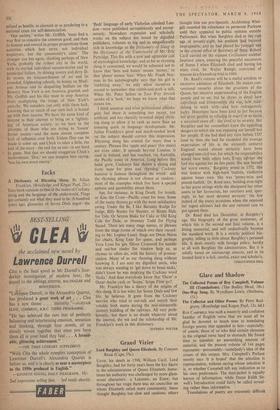Grand Vizier
UNTIL his death in 1598, William Cecil, Lord Burghley, had for forty years been the key figure in the administration of Queen Elizabeth. Some- times his authority was challenged by more glam- orous characters: a Leicester, an Essex; but throughout her reign there was no councillor on whom Elizabeth relied more consistently. Some thought Burghley too slow and cautious; others thought him too pro-Spanish; Archbishop Whit- gift resented his reluctance to persecute Puritans until they appealed to public opinion outside Parliament. But when Burghley died at the ripe age, of seventy-eight, his -position had become impregnable; and he had placed his younger son in the crucial office of Secretary of State. Robert Cecil carried on the regnum Cecilianum another fourteen years, ensuring the peaceful succession of James I when Elizabeth died and having his main rival, Sir Walter Ralegh, convicted of treason in a framed-up trial in 1604.
Dr. Read's volume will be a useful antidote to excessive adulation of Elizabeth. He makes con- ventional remarks about the greatness of the Queen, her intuitive understanding of the English people and so on; but he shows in detail how caPriejotis and irresponsitzle she was, hciw, mad- dening to work with—and how Outrageously Ducky. Historians have been kind to. her because her great. gamble in refusing to marry or to name a successor came off : she lived to be seventy. But Burghley and her counsellors knew the appalling dangers to which she was exposing not herself but her people. If she had died any time before 1587 (and by then she had far exceeded the average expectation of life in the sixteenth century) England would almost certainly have been plunged into civil war, for which the responsibility would have been solely hers..Every adviser she had was against her on this point. She was 'herself her worst enemy,' Burghley wrote in 1572. She was lenient with high-born -traitors, vindictive against lesser men. She was 'penny-wise and pound-foolish,' Dr. Read says, 'holding over-tight to her purse strings while she dissipated her other assets to her favourites, her courtiers and, spar- ingly, to her most devoted servants.' On few indeed of the many occasions when she opposed her sagest advisers had she any rational case to put against them.
Dr. Read died last December, at Burghley's age. His biography of the great statesman, of which this is the second and final volume, is a fitting memorial, and will undoubtedly become the standard work. It is a strictly political bio- graphy, telling us little about Burghley's personal life. It deals mainly with foreign policy, hardly at all with Burghley the administrator. But it is solidly based on manuscript sources, and in its limited field it is full, careful, exact and scholarly.
CHRISTOPHER HILL


































 Previous page
Previous page